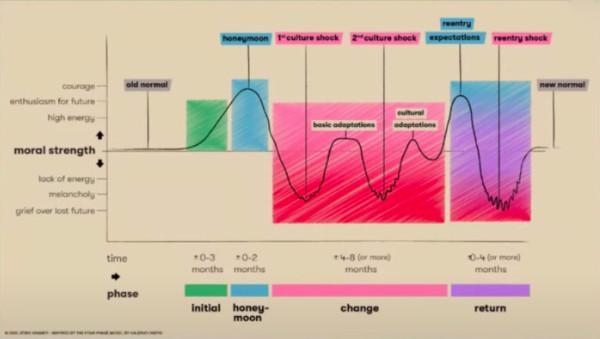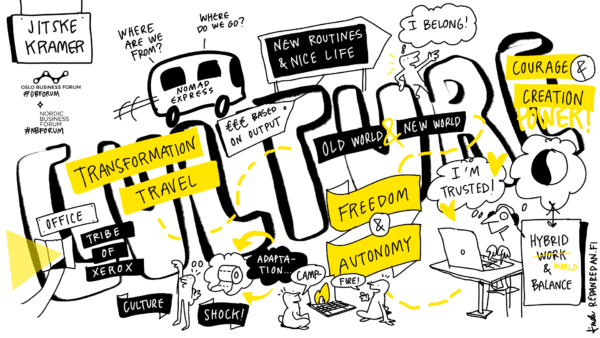16Sep2021
“People shape cultures and cultures shape people.” How? That’s what Jitske Kramer is trying to figure out as an anthropologist; she tries to understand how people group together, how they solve problems, how they lead, etc. And as a corporate anthropologist, she aims to bring those findings into a corporate setting.
On 15 September, we joined forces with Oslo Business Forum and EY to learn more from Jitske Kramer on how to set the stage for the future of work. Here, we take you through her main insights, and you can also watch the recording on our Youtube channel.
A Tribe Is as Strong as Its Relationships
“My quest in life is how do people build strong social groups that are safe for diversity and ready for change. And for an anthropologist, a social group is called a tribe.”
But what is a strong tribe? According to Jitske, a strong tribe has strong relationships. In other words, she argued that a tribe with strong individuals but no interaction is not as strong as it could be.
“So, the focus of a leader should be strong relationships. And with corona, those relationships we’re under attack, which is why we need to think how to build strong relationships in distance.”
Collective Culture Shock
Jitske pointed out that for the past couple of centuries, working culture was dominated by “everyone at the office from nine to five” mentality. But when the pandemic hit, we all needed to do something different. This past norm suddenly wasn’t the standard. “I had the feeling that we were in a collective culture shock, and I think we still are.”
In order to understand the setting we need for the future of work, we need to understand the shock we are in. To help us, Jitske went through the different steps of a culture shock:
- Initial phase. This is where you notice the change and prepare yourself for it.
- Honeymoon phase. This is the phase where you are able to embrace and enjoy the change.
- 1st culture shock. This is the stage where it hits us that we actually need to adapt our routines, behavior, and skills.
- 2nd culture shock. This is where we start to think more deeply about what this change means and how in the bigger picture we need to adapt.
- Reentry expectations. This is where we start to go back to our old habits and routines. We are really looking forward to our old life.
- Reentry shock. This is the phase where we realize that not all our old ways of doing things are actually working and we get another shock of trying to adjust back to the old habits.
- New Normal. This is the stage where we try to adjust the new and the old together; we try to choose what we go back to and what new things we take with us.
Even though the time specifications that can be seen in the graph below are averages and not very accurate for each individual, Jitske highlighted that we need to understand that going through this shock takes time.

According to Jitkse, the question from an organizational perspective is also that are we taking a crisis approach (=we’re going back to the old normal) or a transformational travel (=we’re on our way to the new normal)? “In the beginning, for most, it was a crisis, and now the attitude is shifting towards more transformational travel.”
How to Tackle Hybrid Work
“The true question is not how much office space you have or how do you deal with different apps and technology. I think there’s a fundamental question below it.”
According to Jitske hybrid work is a culture change design issue, and we should ask the following two questions:
- What is the place of work in life?
- What is the place of life in work?
The buzzword hybrid work is not new—it has been around for a long time. Jitske emphasizes that indeed it’s about location flexibility and time flexibility. But there’s also a 4xB formula that can help us to look at hybrid work.
- Bricks: meaning of the building
- Bites: tooling and technique
- Behavior: skills and etiquette
- Belonging: social cohesion, narrative, create memories
According to Jitske what many leaders have now been missing is the last B: belonging. “I think this should be the focal point for all of us.”
Setting the Stage for Future
How can you as a leader set the stage for your organization for the future?
Unfortunately, as with many complex things, the answer is not simple. “There are universal questions, but unique answers.” By this, she meant that there is no right answer, pattern, or guideline on how to make it work. “I don’t believe there is a blueprint. It should be tailormade to your specific organization.”
Each leader, each team, and each organization needs to think what are the values, purpose, and customer needs, etc. for that specific setting. Only then you can figure out how to integrate the best of both worlds for your organization.
Jitske enlightened us that this phase of reintegration of the old and the new is something that anthropologists call liminal space. “This is where you understand that what was, no longer is. What will be, is not yet. And what is, is chaotic and uncertain.” Jitske believes that in order to get ready for the future and learn from this time, we need to make the most of this liminal space we’re in at the moment. We need to step back, keep on learning and experimenting, and take advantage of our creativeness.
To conclude, Jitske shared a list of anxiety and uncertainty skills that will help us now and in the future:
- Openness – new thinking, flexible behavior, judgment
- Acceptance – improvise, go with the flow, be curious, trust
- Personal autonomy – inner purpose, focus on goals
- Emotional strength – resilience, coping, spirit of adventure
- Creation Power – imagination, create new alternatives
“So, setting the stage for the future of work, I think, is making space for the creation of new ways of doing stuff.”
 Visual summary by Linda Saukko-Rauta
Visual summary by Linda Saukko-Rauta
If you want to learn more from Jitkse, we invite you to join our next event: Oslo Business Forum 2021 – Rethinking Business. On 29 September, Jitske will tell us more about the working cultures after the pandemic.

 by:
by: 
